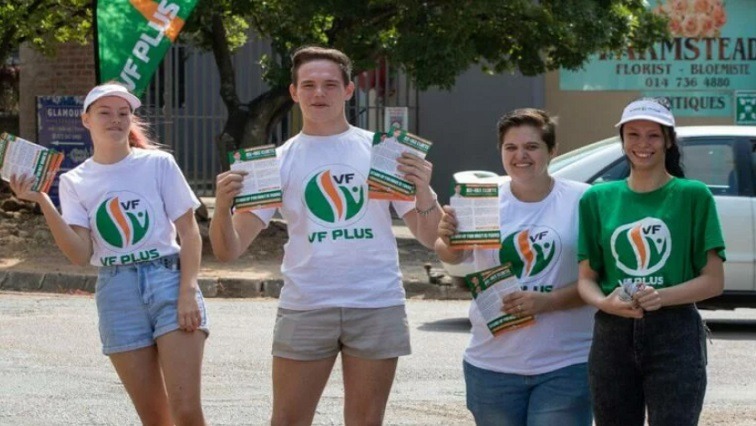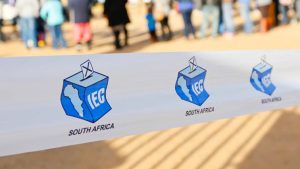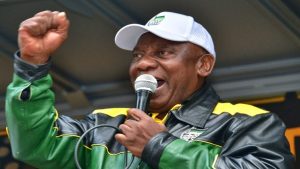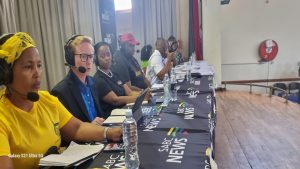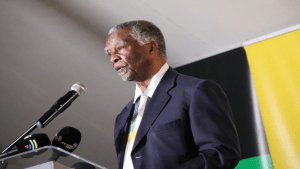The Freedom Front Plus (FF+) launches its 2024 general election offer to voters at the Heartfelt Arena, Pretoria, this Saturday, 2 March 2024. The party co-incidentally also turns 30 this year. It registered as a political entity on 4 March 1994, a few weeks before the country’s first democratic elections on 27 April. According to party spokesperson, Wouter Wessels, the FF+ ‘did not exist before that’.
History of the Freedom Front Plus
The Freedom Front (FF) was formed in 1994. The party was founded by a number of people, including Dr Pieter Mulder, Dr Corne Mulder, Dr Pieter Groenewald and General Constand Viljoen, a former chief of the South African Defence Force (SADF) who came out of retirement to lead a group of Afrikaners who wanted to form a political party. As head of the Afrikaner Volksfront, Viljoen was instrumental in convincing conservative Afrikaners to participate in the new dispensation, through which, he argued, the issue of self-determination should be taken up.
In 2001, Louis Luyt’s Federal Alliance (FA) and the Afrikaner Eenheids Beweging (AEB) joined the FF. In the 1999 general election, the FA won 0.54% of the vote and two seats, while the AEB secured 0.29% and a single seat in the National Assembly. During the March/ April 2003 floor-crossing window, the Conservative Party (CP) joined the Freedom Front. This new entity was renamed the Freedom Front Plus (FF+), in time for the 2004 national and provincial elections.
Instead of fighting for an Afrikaner homeland, the FF+ focused on advancing the cultural rights of Afrikaners. The party also believes the ruling African National Congress (ANC) can and could be defeated through coalition politics.
Since its establishment, the FF+ has remained fairly stable with a turnover of only three leaders, namely General Constand Viljoen (1994 – 1999), Dr Pieter Mulder (1999 – 2016) and Dr Pieter Groenewald (2016 until present).
Tracking the electoral ascendance of the FF+
In the country’s first democratic elections on 27 April 1994, the party captured 2.17% of the vote, equating to nine seats. However, five years later, the party’s support weakened to 0.80% or three seats – a loss of six seats. Speculation is that voters gravitated towards the Democratic Party (DP) – later Democratic Alliance (DA) – and its 1999 ‘Fight Back’ election campaign. Between the 2004 and 2014 general elections, FF+ loyalty remained consistent, with the party maintaining its four seats in the National Assembly. By the time the 2019 election arrived, the party achieved an electoral breakthrough when it increased its support by 1.48 percentage points. Its seat tally in the National Assembly jumped from four to ten seats, a 60% increase.
A similar electoral breakthrough manifested in the municipal space too. Between the 2016 – 2021 local election cycle, the FF+ witnessed 320 948 more votes for it, a 58% increase, that gave it an additional 154 seats (70%).
During the 2016 LGE, the party won representation in eight out of South Africa’s nine provinces. The Eastern Cape was the only place where it failed to get a seat. But by 2021, the FF+ won local representation in all nine provinces for the first time.
Please see below a graphic representation of the party’s electoral performance since 1994 in national, provincial and local elections:
| GENERAL ELECTION RESULTS 1994 – 2019 | ||||||
| 1994 | 1999 | 2004 | 2009 | 2014 | 2019 | |
| SUPPORT | 2.17 | 0.80 | 0.89 | 0.83 | 0.90 | 2.38 |
| SEATS | 9 | 3 | 4 | 4 | 4 | 10 |
| +1.48 percentage point increase; increase in 6 seats between 2014 & 2019 | ||||||
| LOCAL GOVERNMENT ELECTION RESULTS 1996 – 2021 | ||||||
| 1996 | 2000 | 2006 | 2011 | 2016 | 2021 | |
| SUPPORT | – | 0.09 | 0.94 | 0.45 | 0.77 | 2.34 |
| SEATS | – | 8 | 72 | 38 | 67 | 221 |
| +1.57-percentage point increase between 2016 & 2021; +154 seat increase between 2016 & 2021 | ||||||
| Source www.elections.org.za results dashboard | ||||||
Reflecting on the 2019 general election
For the 2019 general election, the party increased its voter support in all nine provinces. The biggest increases came from the highly urbanized Gauteng, adding approximately 117 000 national votes and 101 000 provincial ballots to its haul.
On the national ballot, voter support between the 2014 and 2019 election was up nearly 250 000 votes (60%); and by just over 201 000 (58%) on the provincial ballot. This translated to six more ‘national’ seats and eight additional ‘provincial’ seats.
| GENERAL ELECTION 2014 – 2019 RESULTS | |||||
| 2014 | 2019 | 2014 – 2019 N P | |||
| PROVINCE | N | P | N | P | |
| EC | 8771 | 6818 | 17 699 | 11 548 | +8928 N, +4730 P |
| FS | 19 837 | 21 339 | 33 660 | 35 031 | +13 823 N, +13 692 P |
| GP | 58 122 | 52 436 | 175 152 | 153 844 | +117 030 N, +101 408 P |
| KZN | 9687 | 7695 | 16 460 | 11 269 | +6773 N, +3574 P |
| LIM | 10 269 | 10 102 | 24 042 | 20 572 | +13 773 N, +10 470 P |
| MPU | 11 707 | 11 018 | 33 842 | 29 512 | +22 135 N, +18 494 P |
| NC | 5761 | 4600 | 13 522 | 10 641 | +7761 N, +6041 P |
| NW | 18 120 | 18 746 | 40 225 | 41 266 | +22 105 N, +22 520 P |
| WC | 23 243 | 11 587 | 59 354 | 32 115 | +36 111 N, +20 528 P |
| OOC | 198 | 908 | +710 | ||
| TOTAL | 165 715 | 144 341 | 414 864 | 345 798 | +249 149 national |
+ 249 149 (60%) more votes on NATIONAL ballot + 1.48 percentage point increase; increase in 6 seats (60%) between 2014 & 2019 + 201 457 (58%) more votes on PROVINCIAL ballot + increase in 8 seats between 2014 & 2019
|
|||||
| Sourced from www.elections.org.za results dashboards | |||||
The 2019 surge in the party’s vote share emanated in the main from three areas, namely Johannesburg, Tshwane and Cape Town. On the national ballot, these three metros gave the FF+ 76 000 more votes than in 2014.
And on the provincial ballot, the FF+ increased its support by approximately 59 000 votes.
| THREE METROS WHERE THE FF+ PERFORMED WELL IN 2014 & 2019 NPE | |||
| METRO | 2014 | 2019 | DIFFERENCE 2014 – 2019 |
| Cape Town | 9358 N, 4584 P | 24 669 N, 13 789 P | N +15 311 62%, P +9205 67% |
| Johannesburg | 7262 N, 6041 P | 18 944 N, 15 033 P | N +11 682 62%, P +8992 60% |
| Tshwane | 27 968 N, 26 081 P | 77 097 N, 66 796 P | N +49 129 64%, +40 715 61% |
| National ballot – increase of 76 122 votes or 63% between 2014 & 2019 NPE
Provincial ballot – increase of 58 912 votes or 62% between 2014 & 2019 NPE
|
|||
| SOURCE: IEC election results dashboard | |||
The FF+ begin performing in by-elections
Between the 2019 general elections and the 2021 municipal polls, the FF+ began featuring strongly in by-elections. For example, in four by-elections held between 2019 and 2020 in the North West, the FF+ displaced the Democratic Alliance in places such as Matlosana, Mamusa and JB Marks municipalities.
Please see the table below:
| PROVINCE | MUNICIPALITY | WARD | INCUMBENT | VACANCY CAUSE | WINNER | WIN | TURNOUT | |
| 10 July 2019 | ||||||||
| NW | Matlosana Municipality | 30 | DA | Resignation | FF+ | 56.61% | 34.16% | |
| 18 September 2019 | ||||||||
| NW | JB Marks Municipality | 02 | DA | Resignation | FF+ | 41..71% | 41.02% | |
| 15 January 2020 | ||||||||
| NW | Mamusa | 9 | DA | Dissolved council | FF+ | 50.74% | 61.61% | |
| 11 November 2020 | ||||||||
| NW | JB Marks | 5 | DA | Death | FF+ | 58.86% | 39.06% | |
A few more wins were registered in a few other places since the November 2021 municipal elections.
Huge inroads were made in the 2016 and 2021 local government elections
In the November 2021 municipal elections, the FF+ won 2.34% of the vote, amounting to just over 550 000 ward and PR votes; and 221 seats. This was the party’s best local election result since 1994.
For perspective on how well the Freedom Front Plus had performed:
- Between 2011 – 2016, the FF+ witnessed 108 410 more votes, a 47% increase + an extra 29 seats (43%)
- Between 2016 – 2021, FF+ witnessed 320 948 more votes, a 58% increase + an extra 154 seats (70%)
And between the 2011 and 2021 local government elections, the FF+ went from having representatives in only 6 of South Africa’s provinces to winning seats in all nine.
- In the 2011 LGE, FF+ won seats in 6 out of the 9 provinces; ZERO seats in the EC, KZN & NC
- In the 2016 LGE, FF+ won seats in 8 out of the 9 provinces; ZERO seats in EC
- In the 2021 LGE, FF+ won seats in all nine provinces for the first time
| LOCAL GOVERNMENT ELECTION (LGE) 2011 – 2021 OUTCOMES | |||
| LGE | VOTES | PERCENTAGE | SEATS |
| 2011 | 120 519 | 0.45 | 38 |
| 2016 | 228 929 | 0.77 | 67 |
| 2021 | 549 877 | 2.34 | 221 |
Between 2011 and 2021, party saw + 1.89 percentage point increase or +183 seat surge Between 2016 and 2021, party saw +1.57 percentage point increase or +154 seat surge
|
|||
| Sourced from www.elections.org.za results dashboards | |||
The Freedom Front Plus’ +134 481 vote surge between the 2016 and 2021 local polls originated from mostly four metros, namely Johannesburg, Ekurhuleni, Tshwane and Cape Town.
| METRO | 2016 LGE | 2021 LGE | DIFFERENCE | PERCENTAGE |
| Johannesburg | 8128 | 24 671 | +16 543 | +67.05% |
| Ekurhuleni | 16 050 | 44 668 | +28 618 | +64.06% |
| Tshwane | 35 210 | 105 964 | +70 754 | +66.77% |
| Cape Town | 10 284 | 28 850 | +18 566 | +64.35% |
| TOTALS | 69 672 | 204 153 | +134 481 | +65.87% |
| Sourced from www.elections.org.za results dashboard | ||||
Prospects in the 2024 general election
There is no question the two big stories of the 2019 general election were the performances of the diametrically-opposed Freedom Front Plus and the Economic Freedom Fighters (EFF). While the EFF increased their national seats by 19 to 44 (+43%), the FF+ witnessed a 60% jump in their parliamentary representation (moving from 4 to 10 seats).
Many reasons have been given for the Freedom Front Plus’s extraordinary performance in 2019. These include:
- The party’s niche status ensured it stayed on message to its narrow constituency;
- The party is fairly well-resourced;
- The timing of the ‘land without expropriation’ debate in parliament helped it;
- The DA’s multiple problems helped it;
- and the DA’s veering too much towards the left in pursuit of more Black voters alienated conservative White voters. DA-commissioned research confirms that support amongst White voters plunged from 91% to 74%;
The Freedom Front Plus is poised to do even better in the 2024 general election.
Going by the party’s electoral ascendance since the 2019 national and provincial elections, several by-elections; and the 2021 municipal results, expect another spectacular showing from this little party.
It will win more votes off the DA, especially in the metros and in provinces such as Free State, Gauteng, Limpopo, Mpumalanga, North West, Northern Cape and the Western Cape where there are sizeable White and Coloured minority voters.
Dr. Ronesh Dhawraj is SABC News Research Editor (@ronesh on X)


